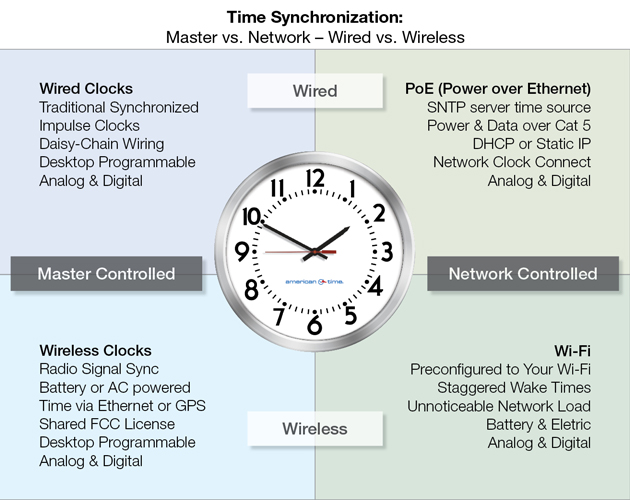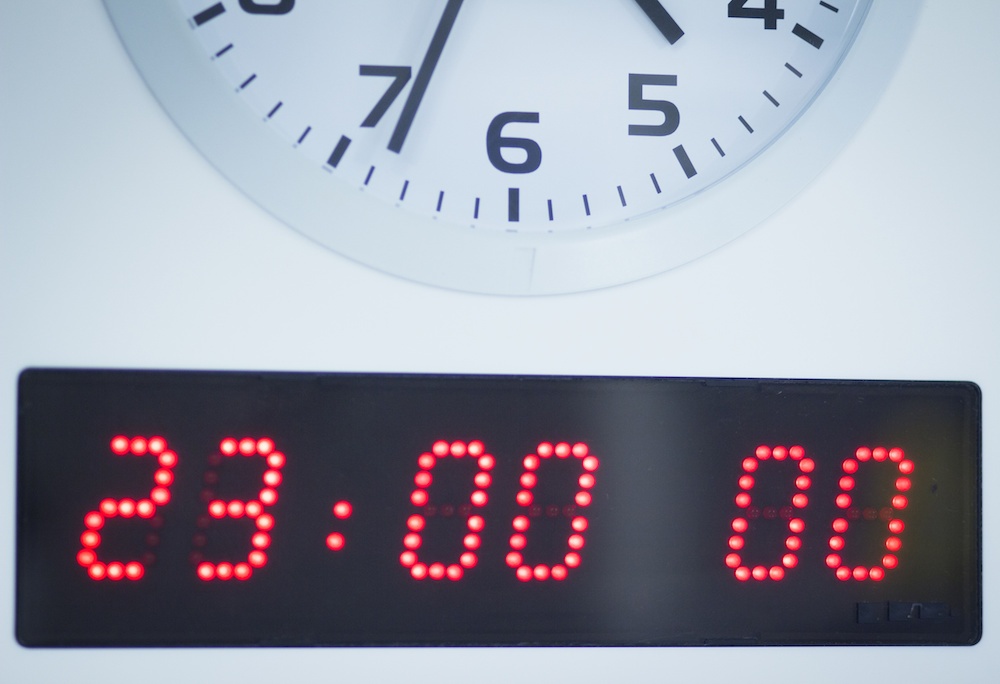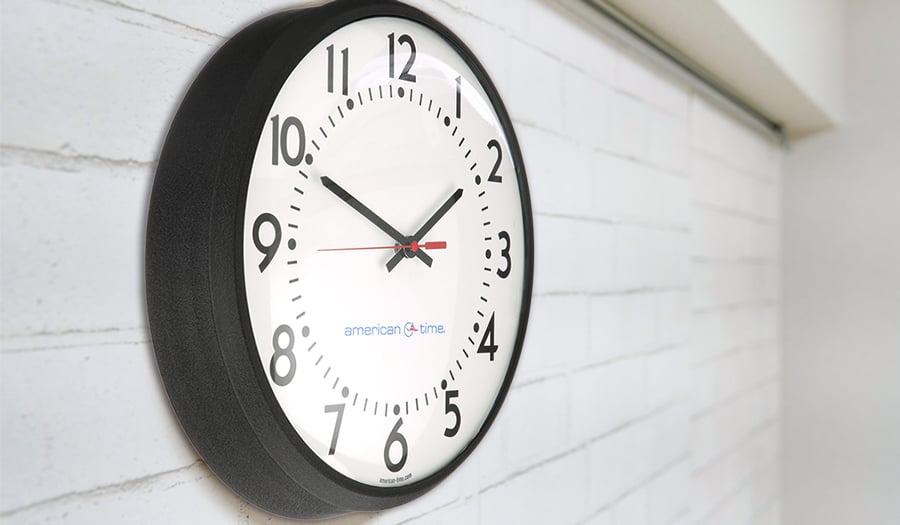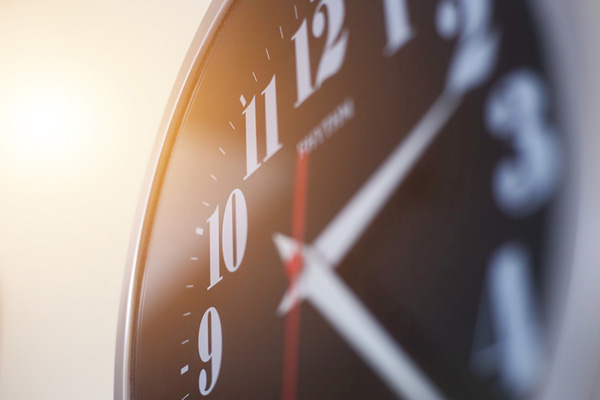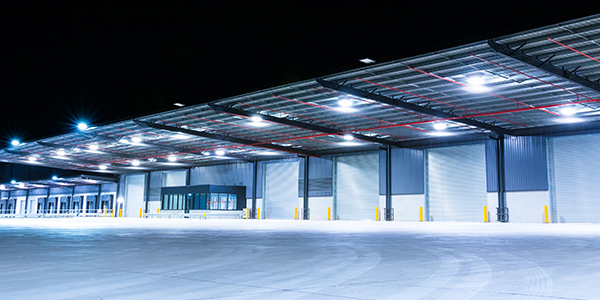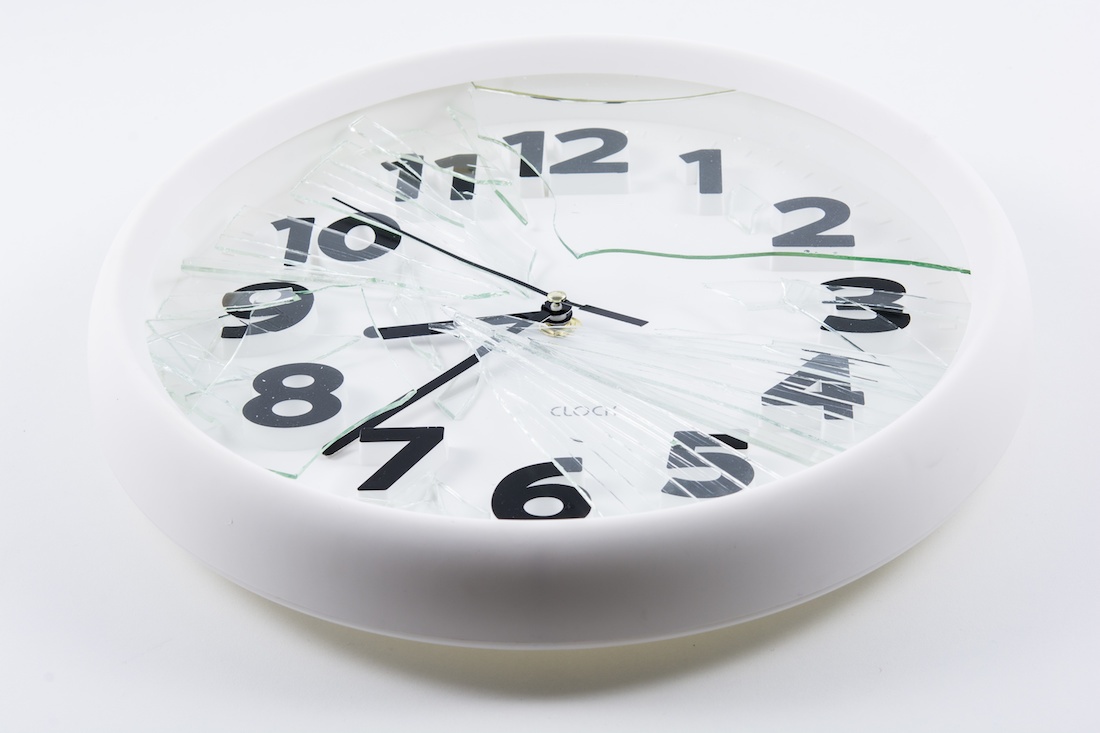Years ago, wired clock systems were the standard, reliable method to keep synchronized time in schools and businesses. Today, those clocks are still manufactured, but there are also wireless options, which utilize more modern technology to transform timekeeping.
So, which solution is best for your school or facilities?
Read More
Topics:
Synchronized Clock Systems,
Wired Clock Systems,
Wireless Clock Systems,
Master Clocks,
System Controllers
A student races to class as the hallway countdown timer nears zero and the bell rings. An employee meeting starts promptly because everyone is on time. Shift changes are in sync and disruptions are minimized.
Things that seem insignificant to the casual observer – like clocks, bells, and buzzers – have an outsized impact on the productivity of a building or campus. Maintenance teams, building managers, IT directors, teachers and leaders know this.
A single, go-to resource for clocks, bells, buzzers, parts, repairs and upgrades – “standardizing” your clock and bell systems – is an important way to improve the efficiency and cost-effectiveness of your operations.
Let’s look at the key considerations and factors to think about in order to standardize your systems…
Read More
Topics:
School Clock Systems,
Synchronized Clock Systems,
Wireless Clock Systems,
Timekeeping,
Master Clocks,
System Controllers
High-quality clocks that stay in precise synchronization must have access to two important sources to operate successfully: A power source and a time source.
However, terms like “wireless clocks” and “wired clocks” are commonly used but often misunderstood. In this article, you’ll learn more about these terms and what they mean for synchronized clocks in your building.
Read More
Topics:
Synchronized Clock Systems,
Wired Clock Systems,
Wi-Fi Clock Systems,
Wireless Clock Systems,
PoE Clock Systems
Accurate, synchronized clocks in your building, school or facility are more than a convenience. When clocks display the wrong time or different times from each other, major disruptions and even risks can happen, such as….
- Meetings, classes or shifts start and end at different times, causing confusion and inefficiency
- Wages or compensation are disputed
- Critical tasks like surgeries, food prep or manufacturing processes aren’t tracked or reported accurately
- Maintenance staff spend too much time on clock repairs and adjustments
| “Employees didn’t have reliable clocks for calculating shift changes or break times. There were lots of debates about whether an employee was really tardy or not, whether some people were abusing their break times by leaving early and returning late, and whether meetings were starting and ending on time.” DMR Electronics |
Read More
Topics:
Daylight Saving Time,
School Clock Systems,
Synchronized Clock Systems,
Wired Clock Systems,
Hybrid Clock Systems,
Wireless Clock Systems,
PoE Clock Systems,
EverAlert,
Digital Clocks,
Master Clocks
The decision arises in all sorts of consumer scenarios: classic versus modern. Maybe you're remodeling your home and you have to choose between dark trim or something light and airy. Perhaps you're trying to decide where to eat dinner, and it comes down to the steakhouse that's been there forever or the trendy new restaurant you've been itching to try.
Or, maybe you were shopping for a watch and had to ponder the benefits of analog versus digital. Your evaluation process of analog versus digital when selecting a new watch probably isn't all that different from picking what kind of clocks to install in your facility. It's just that when it comes to selecting a clock, you've got the needs of potentially thousands of people to consider.
To help you make the call, we'll lay out the advantages and some considerations to make when choosing analog clocks.
Read More
Topics:
School Clock Systems,
Wireless Clock Systems
If you're tasked with selecting a clock system for your organization, the idea might be easy at first: You just buy some clocks and hang them on the walls, right?
But synchronized clock technology offer many options, and the best decision for you depends on the needs of your organization. Here, we'll help determine which type of clock is best for you depending on your industry and the type of building you're responsible for keeping on time.
Read More
Topics:
School Clock Systems,
Synchronized Clock Systems,
Wired Clock Systems,
News,
Clocks for Healthcare,
Higher Education,
Wi-Fi Clock Systems,
Wireless Clock Systems,
PoE Clock Systems,
Architecture,
manufacturing,
Healthcare Facilities,
Facility Management
Daylight saving time (DST) changes were formally established in most of the United States almost 60 years ago, but the biannual changes continue to be a hassle for maintenance teams, facility managers, IT staff and anyone else in charge of keeping a building running smoothly.
Here are some tips for preparing your clocks for DST and troubleshooting if things don’t go as planned.
Read More
Topics:
Daylight Saving Time,
Synchronized Clock Systems,
Wired Clock Systems,
Wireless Clock Systems,
SiteSync,
Timekeeping,
Master Clocks,
Facility Management
Follow the tips below to ensure your clocks and clock systems are ready for the time change.
Routinely check your clocks leading up to Daylight Saving Time
The beginning and end of Daylight Saving Time serve as natural reminders to make sure your facility's clocks are reliably keeping everyone on schedule.
To ensure that a wired system clock is syncing correctly, unplug it, wait at least 10 seconds, and plug it back in. The clock should be receiving synchronization signals from the master controller and display the correct time within 24 hours.
You can take a similar approach to your wireless system battery-operated clocks. Take the battery out, assuring the clock hands come to a complete stop, and reinstall it.
This is a good time to check the life of your batteries, too. If a battery is supplying 1.5 volts or more, it should be good to go. The clock will automatically be on time within 12 hours or sooner.
Read More
Topics:
Daylight Saving Time,
Synchronized Clock Systems,
Wired Clock Systems,
Wi-Fi Clock Systems,
Wireless Clock Systems,
Timekeeping
Your buildings lights, locks, bells and more can be controlled by a Master Clock.
American Time Master Clocks/Controllers can be used for more than keeping your wired or wireless clocks or bells on track; they can help improve other efficiencies throughout your building or facility.
Maximize your master clock investment by using it for….
- Turning lights on/off
- Locking/Unlocking doors
- Turning other equipment on/off
How to Control Devices with a Master Clock
Controlling other devices can be done by using the signal circuits on the American Time Master Clock to trigger devices or external relays, which can control virtually any electronic device.
Read More
Topics:
Wireless Clock Systems,
Master Clocks,
System Controllers,
Facility Management
In rare cases, clocks that are supposed to display precise time and synchronize with each other may fall out of time. Here are a few quick and easy ways to troubleshoot and keep them ticking on the right time.
Read More
Topics:
Clock Maintenance and Repairs,
Synchronized Clock Systems,
Wired Clock Systems,
AllSync,
Wi-Fi Clock Systems,
Wireless Clock Systems,
PoE Clock Systems,
SiteSync



